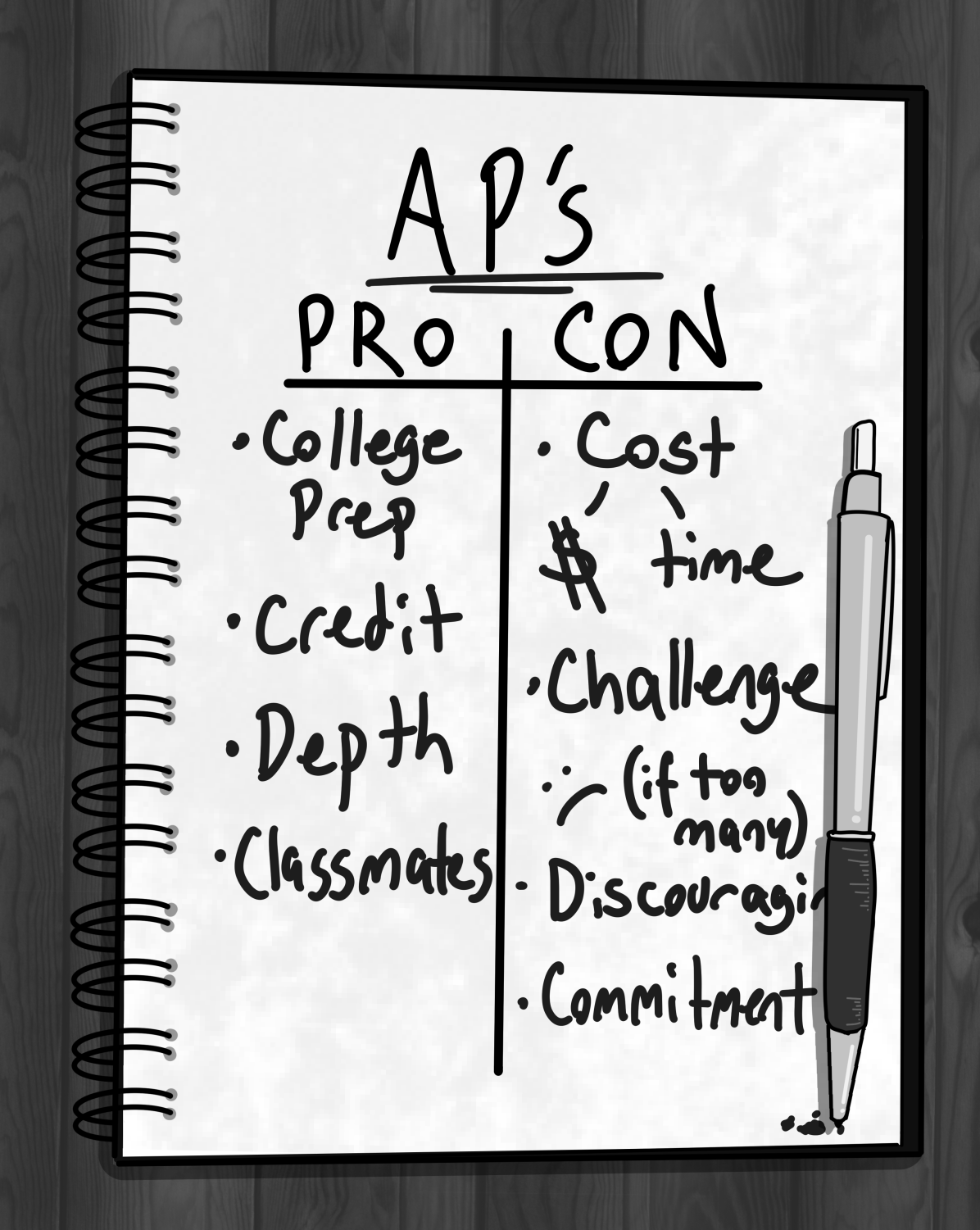Pro/Con: The question of AP classes
March 9, 2022
Pro: To challenge and stand out, APs should stay
When I headed into my junior year, I knew that I wanted to take as many Advanced Placement (AP) classes as I could for a variety of reasons, and so I did. While there are many benefits of taking AP courses, what I really wanted was to be able to set myself apart from others when colleges received my applications, as well as engage with subjects in a fast-moving, comprehensive way. Now with just a semester left in my high school career, looking back I can say that I absolutely made the correct decision; AP classes have proved to be valuable for me in countless ways.
In recent years, more schools have gotten rid of AP classes for different purposes. Institutions like Scarsdale High School, Choate Rosemary Hall and Ethical Culture of Fieldston School have all eliminated APs and replaced them with various other advanced and honors systems. And while Masters has begun to question the practicality of APs, the truth is that a removal of AP courses entirely would serve not as a benefit, but instead, a detriment to the student body.
In a 2018 opinion piece written in The Washington Post by eight heads of private D.C. area schools, arguments against AP classes ranged from colleges placing less importance on them, to the fact that APs cause students to spend more time memorizing and less time learning deeply. And while there is some truth to these arguments, personal experience as a high school student has shown me otherwise.
The article argues that AP classes are becoming less important as more students enroll in them, but this claim fails to take into account the full scope of things. According to a U.S. News blog about college admissions, “generally” the most important part of a college application “is the GPA and challenging high school curriculum,” said Jeannie Borin, the founder & president of College Connections, a college consulting service that has aided over 4,000 families in the college search process since its establishment in 2003. As someone who has visited around a dozen colleges thus far, this fact has been confirmed at every single information session: GPA and rigor of course load are the most important components of an application for colleges. Even if more students across the nation are taking AP courses, being unable to take AP courses sets students who are looking at the most competitive schools behind the eight-ball straight away, for they will be deemed sub-par in relation to their peers.
According to Crimson Education, a service that helps students get accepted to their desired colleges, “For students aiming for the Ivy League and Top 20 schools in the United States, a good target is to take (and pass) 10-14 AP classes throughout your high school career — or 3-4 each year.” While they also note that it is important to have a balance in life and taking into account that Masters only allows students to take a maximum of three AP classes in their junior and senior years, it is necessary for students to utilize these higher level courses to better their transcript. Although colleges continuously say that they look at students within the context of their school – that is they won’t judge a student for not taking AP classes if AP classes are not offered at their school – a student who wants to but is not able to take AP courses is unable to set themselves apart from a student that would not have chosen to take AP courses even if they had been offered.
At the same time, it is important to recognize that not every student will be looking to attend the most competitive schools, but instead will be taking AP courses for another reason: the credit. While AP credit rules differ between schools, credits acquired through high scores on AP exams allow students to have more opportunities in college. This means that students may have the ability to take higher level courses going in, skip classes entirely (which can help those that want to graduate earlier to save tuition), or both. As someone who wants to explore a variety of subjects in college, earning AP credit to skip certain courses would grant me the freedom, and time, to take classes in numerous fields, which is exciting.
Even though taking AP courses now will serve me well down the line, I recognize that AP courses have current benefits, too. I have always loved fast-paced classes and AP courses provide me with the opportunity to learn in that environment. Furthermore, taking AP courses, which are often challenging for the speed and immense amount of material covered, I have begun to recognize the importance of creating good homework and study habits. While no high schooler is perfect with time management, learning these skills now will only continue to serve as a benefit as I transition to college life.
Additionally, while AP courses are great for students that learn at a fast pace and for those that like to absorb a lot of information, taking AP courses has allowed me to dive deep into subjects that are interesting to me. For example, because I want to study finance in college, I wanted to, and did, sign up for AP Statistics this year. Through this class, I have been able to learn thoroughly about a subject that greatly intrigues me, enhancing my learning experience.
While I believe that we should keep AP courses, I am clearly not the only one who holds this opinion. In a survey sent out to the Class of 2024 and the Class of 2025, 92.9% of respondents (99 responded out of 253 students) stated that they wish to take AP courses during their junior and/or senior year. Additionally, in a survey sent to the Class of 2022 and the Class of 2023, out of those who have chosen to take AP courses, 84.8% of respondents are happy with their decision (79 students, who take AP classes, responded to this question (88 people responded to this survey in total) out of 258 students).
Yet though AP courses provide numerous benefits to students, it’s no secret that they are limiting in certain areas. Common complaints include a course curriculum that is too fixed, a homework load that is too great, etc… And while there is some truth to these arguments, the fact of the matter is this: if students do not want to take AP classes for any reason, then they simply should take the standard course, or an elective course, in that subject. Eliminating AP classes does not solve any sort of problem for the students that are opposed to taking them, but instead it only hurts students that do want to take these advanced classes.

Senior Ethan Schlapp currently works as Tower’s Lead Sports Editor. Schlapp joined Tower in his sophomore year. As a member of the Tower staff, he soon...
Con: Choose interest over rigor and get rid of APs
The course load of AP classes often takes a toll on students and does little in increasing interest in a subject.
As high school students begin to think about the importance of their transcript, Advanced Placement [AP] usually comes to mind for most students. In simple terms, AP classes are college level courses students take in high school. These classes are known for their rigor, high demand and the possibility of college credit. The Masters School offers a variety of AP classes in all subject areas including math, science, English and history. I am a junior this year taking three AP courses and I believe that Masters should remove the option of taking AP classes.
When choosing my courses for junior year, I went back and forth on whether or not I should take APs. There were several science seminars that I was interested in, both in biology and in environmental science. This was the same case for English, where I was struggling to choose between seminars and APs. For both subjects I ultimately chose AP Biology and AP English Language for one reason: college. The biggest deciding factor was how these classes would look on my transcript. Since APs are the most rigorous classes that Masters offers, I blindly chose that option regardless of whether or not I was actually interested in these APs. Students are told that colleges tend to look at the difficulty and rigor of your classes when assessing your transcript; this information alters students’ decision when choosing courses, steering them away from meaningful learning.
There are many reasons that I think APs should not be a part of the Masters curriculum. First and foremost, it takes away from the meaningful learning experiences Masters offers. The Upper School extends the unique opportunity to choose which classes you would like to take. The options range from semester long seminars, to honors classes, to AP classes. Because the application process has told us that colleges want to see challenging and rigorous classes on high school transcripts, students tend to choose the harder classes over courses they are genuinely interested in. This begins the cycle of academic validation and competition among students.
Junior Giselle Meskin, had the opportunity to choose AP courses for English and history classes but chose American Studies, Masters’ combined-humanities course for juniors, instead.
Meskin said, “I always have to explain why I am taking American Studies and that I need to essentially prove my intelligence and prove to them that I am actually smart.”
English and history APs don’t specifically target a student’s interests, whereas seminar classes are designed around one subject matter. “Students are given a total myriad of options that they can choose from and can cater to their individual interests and what they want to talk about, what they want to learn about, and what they want to become experts on,” Meskin continued.
While students may fear that the courses they are taking won’t look as challenging if there are no APs on their transcript, this problem can be solved by removing APs entirely. This removes the pressure students face both when taking APs or when deciding courses.
Cheryl Hajjar, chairperson of the visual arts department, has been working at the Masters School for 13 years. Among the numerous art courses she teaches at Masters, two of them are APs: AP Art History and AP Art and Design. Hajjar has the ability to write her own curriculum for these AP courses but is limited to the specifications of the College Board. “Even though it is my curriculum that I write, it is a curriculum that is dictated by the requirements of the College Board,” she said.
Hajjar also worked at the Graduate School of Columbia University, where she was a part of their admissions team, “I did a survey with about 25 different college admissions officers about how important the AP’s are to them. And they said, I would say, 85% of them said that they’re not looking for AP’s; they’re looking for students to challenge themselves within their own personal best kind of milieu,” Hajjar continued. “They’re looking for students to not just challenge themselves academically but also be extremely community minded and have other interests outside of academics. That’s what they valued much more in terms of their admissions decisions.”
Hajjar has been with Masters for over a decade and has been able to see the impact of AP’s in the Masters community. She said, “In my years teaching here, the [AP] program has changed a lot and it has become a much healthier program. But I still feel like we have a dynamic enough faculty to really create challenging courses for students, that are much more student driven, and will support their learning based on their passions and combining passions.”
Many independent schools in New York have already taken the initiative to remove APs as an option, including The Dalton School located in NYC. Dalton got rid of AP classes in 2003, as critics of APs began to notice the pressure it put on students. The rigid curriculum that all APs must follow does not give teachers any flexibility to expand on certain topics or focus on topics of less relevance to the exams. The strict curriculum along with the constant assessment of performance can lead to students developing a reliance on academic validation based on how high they score on an exam.
While I understand that there are students who choose to take AP’s for the challenge they provide, Masters has done a strong job of providing courses that permit the same level of difficulty, without the AP label. Courses such as Master’s Thesis and American Studies accommodate students with a challenging class while being able to focus on certain topics. Another aspect that needs to be addressed: a multitude of colleges that Master students apply to do not actually accept the AP credit from these courses.
Many students attend private schools for a more individualized learning experience. AP’s detract from that often alluring aspect of independent high schools like Masters.
As an independent school, Masters has more flexibility with their curriculum and what courses they are able to offer. I think students should focus on taking advantage of this exclusive circumstance rather than aim to take the most challenging course possible. Masters is offering students the chance at meaningful learning and to discover passions in certain subjects, this opportunity should not be looked over because it lowers your chances of getting into a more prestigious college. These courses can still be as rigorous as AP’s but with the specialties that private schools offer.


